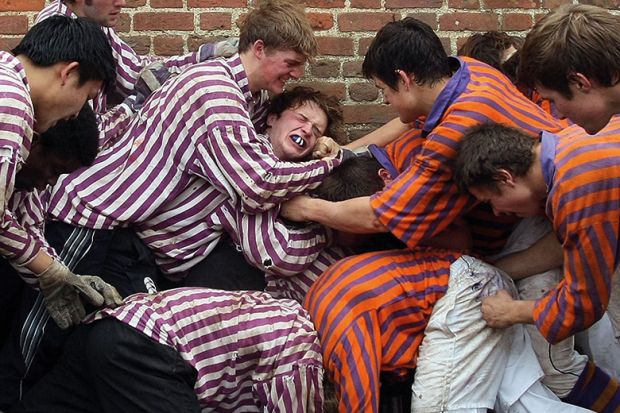Further evidence of comprehensive school students’ “significant advantage” that makes it more likely that they get a good degree from a UK university compared with similar students from private schools is presented by a new study.
Analysis of the degrees achieved by nearly 9,000 graduates of one English university, which controlled for A-level grades, found that state school leavers were more likely to achieve a first or a 2:1 than their private school counterparts in seven out of the 11 entry qualification combinations considered.
For example, considering full-time students who graduated in 2010, 2011 and 2012, 95 per cent of state school students who got AAAA at A level got a good degree, compared with 91.1 per cent of their private school peers. Among students who got AAB, 82.7 per cent of state school students got a first or 2:1, compared with 80.7 per cent of private school leavers.
The researchers, led by Steven Jones, senior lecturer in education at the University of Manchester, conducted further modelling that confirmed that “coming from a comprehensive school leads to a significant advantage” in terms of degree attainment over students from independent schools, as well as grammar schools and sixth-form colleges. The researchers stress that entry qualifications are the strongest predictor of success at university.
“Students from state schools are more likely to become high achievers than those from independent schools who enter university with the same grades,” the researchers write in Research in Post-compulsory Education. “We see this as evidence that the full academic potential of high-ability state school children is not always realised until those children reach university.”
This is not the first study to find that state school students have an advantage over their private school peers at university. In 2015 a study by the University of Cambridge’s examination arm, Cambridge Assessment, found that private school leavers at Russell Group universities were about a third less likely to achieve a first or a 2:1 than state school students with similar entry grades.
Another study by the Higher Education Funding Council for England also found that state school students were more likely to graduate with the top classifications than private school students with similar backgrounds.
Dr Jones and his colleagues say that the advantage of studying just a single university, unlike the earlier studies, is that it minimises the variation “caused by disparate universities having different degree-awarding regulations”.
However, Chris Ramsey, joint chair of the university subcommittee of the Headmasters’ and Headmistresses’ Conference, which represents independent schools, said that studies of undergraduate performance were “notoriously difficult to keep in proportion”.
“By far the strongest predictor of university outcomes is prior attainment,” said Mr Ramsey, headmaster of Whitgift School.
“A small number of mid-performing A-level students do ‘better’ than would be expected at university when they come from some types of maintained school – around 1 per cent of all state school entrants to higher education,” Mr Ramsey said. But top performers from all school types “overwhelmingly gain outcomes at university exactly in line with their 18-plus attainment”, he added.
Register to continue
Why register?
- Registration is free and only takes a moment
- Once registered, you can read 3 articles a month
- Sign up for our newsletter
Subscribe
Or subscribe for unlimited access to:
- Unlimited access to news, views, insights & reviews
- Digital editions
- Digital access to THE’s university and college rankings analysis
Already registered or a current subscriber? Login










